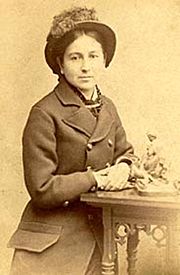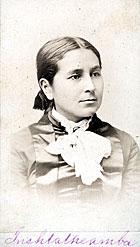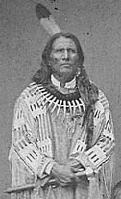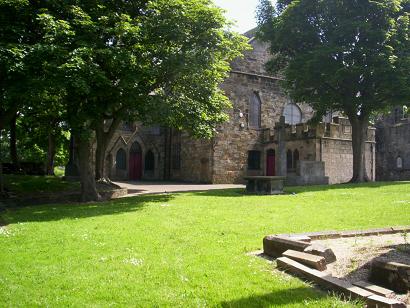

| Home Contents Contact |
|
|


During 1887-88, at more or less exactly the same time when Buffalo Bill’s Wild West brought an entirely different vision of the vanishing American West to English audiences, a civilised and educated Native American lady, Susette La Flesche (1854-1903), and her white husband, crusading newspaperman Thomas Henry Tibbles, undertook an extensive lecture tour of Great Britain. Their purpose was to promote the cause of Indian citizenship and collections were taken for the advancement of school and church buildings on the Omaha reservation in Nebraska. Susette was the mixed-blood daughter of Joseph La Flesche, otherwise known as Iron Eye, the final principal chief of the Omaha tribe, who presided over the difficult transitional years in the mid-19th century during which the tribe was reduced to the reservation and subjected to accelerated assimilation programmes. Throughout her life, her two names - Susette’s tribal name was Bright Eyes (Inshtatheamba) - seemed to her to betoken two entirely separate personalities. She disliked the title of ‘Princess’, applied to her by certain white men, woefully ignorant of the true nature of indigenous Indian government but was pragmatic enough to recognise it as a means to the end.
In the wake of the media circus set in motion by the cause celebre, a tour of the lecture circuits of the eastern cities was organised. It was intended to highlight the government’s mistreatment of the Ponca, as well as to assist the Omaha, who were now threatened with enforced removal to Indian Territory, and also to raise the issue of Native American rights generally. Susette travelled in the capacity of interpreter to Standing Bear, who participated in person. Susette later became romantically involved with Thomas Henry Tibbles, who was the driving force behind the Standing Bear campaign and the lecture tour, and the couple, now established as effective lobbyists with a significant influence upon the real course of events, were married.
She came to a position of national prominence through her indirect involvement in the landmark case of Standing Bear v Crook which came before a U.S. federal court in 1879. The judgement in this highly publicised case, involving a Ponca chief, established that Native Americans are ‘persons’ in the eyes of United States federal law and are thus entitled to apply for the writ of habeas corpus. Standing Bear, the plaintiff, is frequently and erroneously conflated with a Lakota of similar name, Luther Standing Bear, who came to England in 1902-03 as interpreter for the Indians in Buffalo Bill’s show. 
Standing Bear never toured again but Susette and her husband continued to fly the flag, travelling not only within the United States but as far afield as Scotland and England. It is hoped that a reasonably comprehensive picture of their British sojourn can eventually be determined but for now I have positively established that Glasgow, Edinburgh, Aberdeen and Kilwinning number among the cities and towns which they visited whilst in Scotland.

The Abbey Church, Kilwinning, was Susette’s venue on 1st May 1888.
THE NORTH AMERICAN INDIAN MISSION.- Last night, in the Free West Church, Mr and Mrs Tibbles (“Bright Eyes”) delivered the second of a course of addresses which they purpose giving in Aberdeen in behalf of the Red Indians of America. Mr John Sangster, who presided, introduced the speakers to the large audience. “Bright Eyes” first addressed the meeting, giving a very interesting account of the manners, habits, and general life of the inhabitants of the “Wild West.” Her husband followed with a graphic sketch of the condition of the North American Indians, and the great need there was for further effort being made in the shape of missionary work for the Christianisation of the aboriginal tribes. Both addresses were listened to with evident interest, the audience showing by their rapt attention their appreciation of the earnest and simple story told by “Bright Eyes,” and the vigorous manner in which Mr Tibbles pleaded the cause. A collection was taken in aid of the fund for establishing churches and schools on the Omaha reservation.
- Aberdeen Journal, 10th January 1888



